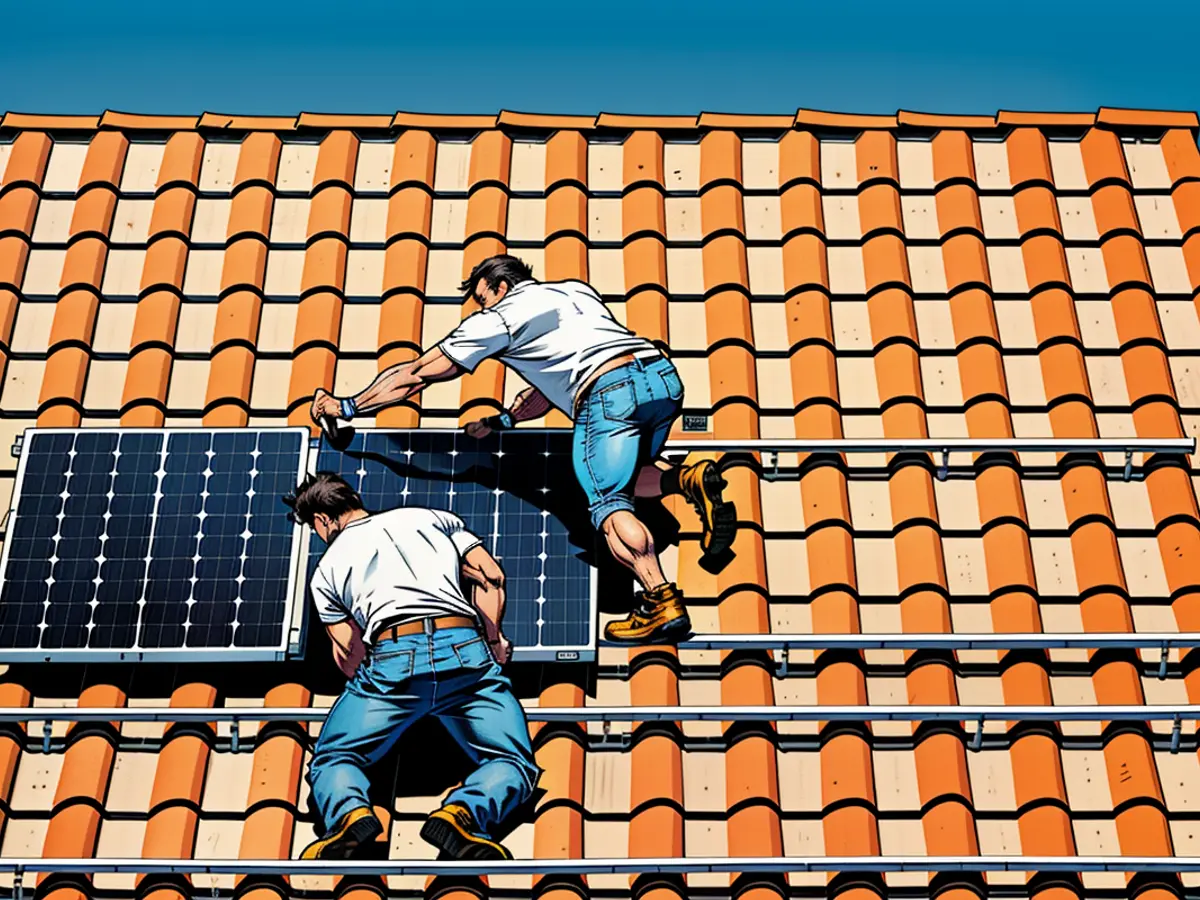Homeowner - Heat pump, Solar, Power storage: How good are combination systems for houses?
Overall, Germany could produce an additional 623 Terrawatt-hours of solar energy per year, according to the Solar Atlas of the German Aerospace Center (DLR), if all suitable areas were utilized. This equals 623 billion Kilowatt-hours and is enough to supply around 180 million households with an average consumption of roughly 3400 kWh annually. For comparison, there were approximately 42 million households in Germany in 2022. If these potentials are efficiently utilized, Germany could theoretically supply almost five times as many households as it actually has.
The step towards energy independence is becoming increasingly attractive for many homeowners. According to a recent study by RWTH Aachen University and energy company Eon, a combined system of solar panels, heat pump, and battery storage is already amortized after eleven years. For heat pumps alone, this takes up to three years longer. A central energy system can also reduce energy costs by up to 70%. The study compares houses of various ages in the cities of Essen and Munich.
For solar systems, there are municipal funding programs
The study shows that combined systems consisting of a heat pump, solar panels, energy storage, and management system are not only suitable for new buildings but also for existing properties. However, it may be worthwhile to first create a renovation plan. "This could mean that one does not necessarily have to start with the installation of a new heat pump, but rather with making the house more energy-efficient through new windows or insulation," says Dagmar Faltis, managing director of Aroundhome, a recommendation platform that connects homeowners with contractors for their home projects. Faltis recommends checking first where a household in an existing property can save energy.
If a house is sufficiently energy-efficient, it is worth installing such a combined system. According to Faltis, homeowners should plan on costs of up to 75,000 Euros. This may initially seem like a lot of money. However, those who decide to switch to climate-friendly energy sources can receive state subsidies from the KfW, the Federal Ministry of Economics and Export Control (BAFA), and the respective municipalities for the individual modules.
The KfW subsidizes the costs for purchasing, installing, and commissioning heat pumps up to 70%. Individual measures to make the house more energy-efficient, such as insulation or window replacement, are funded by BAFA up to 20%. For solar systems, there are municipal funding programs – for example, in the cities mentioned in the RWTH Aachen study: Munich, for instance, will subsidize PV systems on residential buildings from July 2024, for example, with roughly 250 Euros per Kilowatt-Peak Leistung. For modules on listed buildings and roof-integrated systems, there are grants. Since a temporary funding stop, the residents of Essen have been able to benefit from funding for a PV system again since the beginning of the year 2024. Essen subsidizes the purchase and installation of a PV system, for example, with 1000 Euros for systems with more than five and up to ten Kilowatt-Peak Leistung.
Green light for balcony power plants
The study also shows that the use of balcony photovoltaic systems is worthwhile. These systems can generate up to 3,000 kWh of electricity per year, depending on the location and size of the balcony. This is enough to cover the electricity consumption of an average household. The installation of such systems is also increasingly subsidized by municipalities. For example, the city of Munich has been subsidizing balcony photovoltaic systems since 2018. The city of Essen also offers funding for such systems. The costs for a balcony photovoltaic system can range from 5,000 to 15,000 Euros, depending on the size and location of the balcony. With the subsidies, the payback period is usually around ten years.
People who produce energy themselves save natural gas electricity costs. However, consumers cannot fully self-supply themselves even with energy production systems and energy storage, therefore many households still need to use electricity from the grid. Starting from the year 2025, combination systems with intelligent management systems will be even more attractive for homeowners. All electricity providers will then be obligated to offer a dynamic electricity tariff, where electricity prices change depending on usage throughout the day. Consumers will have the opportunity to buy electricity when it is cheaper.
For people who rent and would like to live a little more energy independent, balcony power plants are suitable. A new law makes this easier for them. The Bundestag has classified balcony power plants as a "privileged measure" in tenancy and cooperative ownership law. This means that it has become harder for landlords and housing cooperatives to prohibit their installation.
- The potential for increased solar energy production in Germany is significant, with the Solar Atlas of the German Aerospace Center (DLR) estimating an additional 623 Terrawatt-hours annually, equivalent to supplying nearly five times the current number of households if all suitable areas were utilized. (Solar energy, potential, households, DLR)
- In their study, RWTH Aachen University and energy company Eon found that a combined system of solar panels, heat pump, and battery storage can be amortized after eleven years, and a heat pump alone in up to three years, potentially reducing energy costs by up to 70%. (Solar panels, heat pump, study, Eon, energy costs)
- According to Dagmar Faltis, managing director of Aroundhome, a recommendation platform for home projects, creating a renovation plan can help identify opportunities to make a house more energy-efficient before installing a new heat pump or solar system, and municipal funding programs can assist with the costs. (Renovation plan, energy-efficient, heat pump, solar system, funding programs, Dagmar Faltis)
- In line with the RWTH Aachen study, municipalities like Munich and Essen are offering subsidies for solar systems and balcony photovoltaic systems, such as subsidies per Kilowatt-Peak Leistung for Munich's residential buildings from July 2024, or 1000 Euros for Essen's systems with more than five Kilowatt-Peak Leistung, starting from 2024. (Municipalities, subsidies, Munich, Essen, Kilowatt-Peak Leistung)








